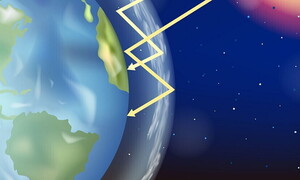Science: Anaximander’s revolution
29 April 2024

Rerum fores aperuisse, Anaximander Milesius traditur primus. Anaximander the Milesian is reported to have been the first to open the doors of nature.
[Plinio, Storia Naturale, II, 31]
It is with this quotation from Pliny the Elder, the famous naturalist who lived in ancient Rome from 23 to 79 AD, that Carlo Rovelli – a theoretical physicist known to other scientists for his research activity and to the general public for his books explaining science – opens his essay “What is science. Anaximander’s revolution.” By following the formidable thinking of Anaximander – philosopher, cartographer and naturalist – who lived from 610 to 546 BC, Rovelli’s book takes us on a journey through the history of scientific thinking, amongst the crucial turning points of the past and challenges for the future. Fasten your safety belts, because we will try to travel through 3 thousand years of investigations into the world and nature in just a few lines.
The context: Miletus around the 6th century BC
It is impossible for us to understand the power of Anaximander’s teaching if we do not first make an effort to imagine and try to immerse ourselves in the context in which he was born and lived. This was the 6th century before the birth of Christ: the Assyrian Empire was collapsing, while the Persian Empire was gaining power; Egypt was governed by the 26th dynasty of Pharaohs, Rome was ruled by Tarquinius Priscus and Milan had just been founded by the Celts. Two hundred years earlier, Homer composed the Iliad and two hundred years later Greece was to live the golden age of Pericles and Plato. Anaximander was born in Miletus, a city on the coast of south-west Anatolia, at the time a strategically important trading port, and a melting pot on the border between East and West, where not only goods, but also people, knowledge and ideas circulated.
Around the 7th century BC, however, something crucial happened in Greece in the history of knowledge: thanks to the arrival, modification and simplification of the Phoenician alphabet, writing became accessible to greater numbers of people, ceasing to be the exclusive domain of scribes and priests. “Secret knowledge” left the confines of the palaces of sovereigns and became accessible to a broader dominant class, with obvious cultural, social and political consequences. The pólis became an independent body and it was no coincidence that, as Rovelli reminds us, the first democratic constitution of Athens (that of Solon) was written in this period. It is clear that a political and social process of this significance was at the same time the cause and effect of a new way of thinking, which also enormously influenced the approach to knowledge of the world: the best conclusions are those that emerge from debate between many people and for this reason knowledge must not be kept secret, but on the contrary divulged as far as possible, discussed, criticised and corrected, to ensure that the best ideas emerge.
Certainly, the debate on “open science” is very topical. Indeed, human society not always has been – and is – able to guarantee access to knowledge. You only have to think of innovation in the military field (did you know, for instance, that the very first embryonic form of internet risked remaining secret, concealed by the American army?), of the very topical debate on open access (for example, with regard to access to scientific publications) or that Christianity in the early centuries led once again to a concentration of knowledge in the hands of the divine (an example of this was the trial of Galileo Galilei).
Therefore, it is clear that the way of “conducting science” and the way of “conducting politics”, of organising society and distributing knowledge and power are closely connected and co-evolve, reciprocally influencing each other. Yet there is more: Miletus, just like the sharing of the knowledge that its men produced, was “by far the most open Greek city in the world and in particular was open to the influences of the ancient empires and their centuries-old culture.” It was an ideal condition for welcoming great thinkers because, as Rovelli explains, “civilisations flourish when they mix”, as proved by the thriving Italian Renaissance, “sparked by the arrival in Europe of the knowledge from the Arab world.”
Anaximander, meteorology and space
But what is the most importance inheritance left by Anaximander and why is he considered by some as perhaps the greatest thinker of ancient times? Let us look together at some of the most revolutionary new ideas introduced by Anaximander.
“Meteorological phenomena have natural causes”, in the past they had always been explained by mythical-religious causes (for example attributing the origin of rain and lightning to Zeus, of waves to Poseidon and of wind to Aeolus). Anaximander claimed that rainwater is sea or river water that evaporates due to the heat of the sun and that lightning originates from the collision and splitting of clouds, just as earthquakes are caused by the cracking of the Earth due to excessive heat or excessive rain. Beyond the fact that much of what Anaximander wrote corresponds to reality (to understand the origin of earthquakes, we had to wait quite a few centuries…), the sensational importance of his thinking lies in the fact that he was the first to give an exclusively naturalistic interpretation of the world, without recourse to divinities.
“The Earth is a body with a finite dimension floating in space. It does not fall because it does not have a special direction in which to fall and is not ‘dominated’ by any other body.” Anassimandro did not think that the Earth was spherical (on the contrary he thought that it was cylindrical or disc-shaped), but the importance of his contribution lies in the fact that he understood that the Earth has precise confines and that it is suspended in space, a concept at which he probably arrived by observing the stars disappear and reappear behind the Earth: if, for example, the Sun disappears in the West and reappears in the East, there must be space behind our planet that “allows it to pass”. Yet if we are suspended in the sky, why do we not fall? As Aristotle says in De Caelo [295, 11]: “There are some, Anaximander, for instance, among the ancients, who say that the earth keeps its place because of its indifference. Motion upward and downward and sideways were all, they thought, equally inappropriate to that which is set at the centre and indifferently related to every extreme point; and to move in contrary directions at the same time was impossible: so it must needs remain still.” Anaximander thus overturned the initial question, which became: why should the Earth fall? Unlike the objects that we see fall in our everyday life, our planet does not have a privileged direction to fall.
Anaximander, the origin of all things and the virtue of rebellion
If, on the one hand, Anaximander attributed natural causes to the phenomena that we observe, thus separating them from the gods, on the other he based his thinking on the fact that not everything can be directly perceived by humans. One the best-known theories developed by Anaximander is in fact that of ἄπειρον, according to which the wide range of things that make up nature all derive from a single origin or principle – which, indeed, he called the ápeiron – that is indefiniteness. In this case, too, it was a major intuition: the atoms of Democritus and Leucippus can be considered as the heirs of ápeiron and even Faraday’s incredible discovery of electric and magnetic fields, as well as Einstein’s theory of relativity, over two thousand years after Anaximander, describe an entity that is not directly perceivable, and ther are many more examples that could be given.
With his theory of the ápeiron, Anaximander tried to improve on the theory of Thales, who was probably his master, considered by Plato as one of the seven sages of Ancient Greece, and known for his mathematical theorems, who had attempted to trace the variety of natural phenomena to a single original and unitary element: water. Anaximander, while recognising the intellectual breakthroughs achieved by Thales, pointed out their errors too, in the firm belief that it is possible to do better. In other words, the new idea introduced by Anaximander, which Rovelli indicates as one of the greatest contributions by the Greek philosopher and naturalist, is a new approach to knowledge, portraying truth as something that is accessible gradually, through discussion, by progressive refinement. It was something that was fundamental in the history of scientific thought, characterised by constantly “questioning the hypotheses and results obtained in the past”. His rebellion against his master, the ability to absorb his teachings while maintaining a critical attitude towards them, according to some scholars, is the basis of modern scientific thought.


